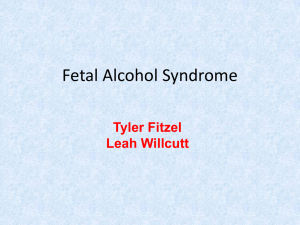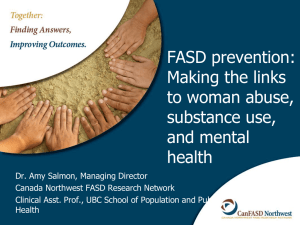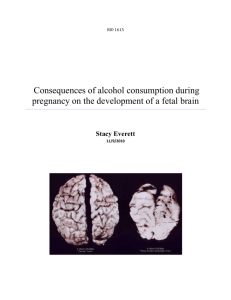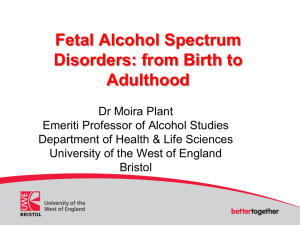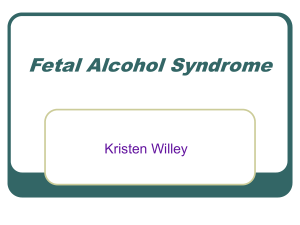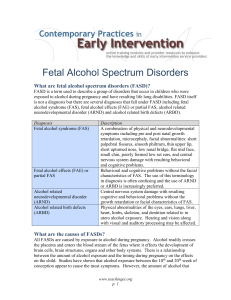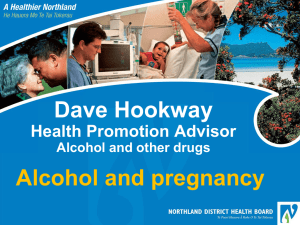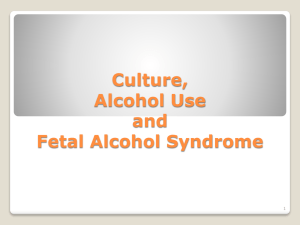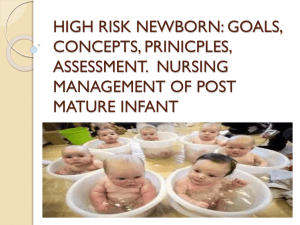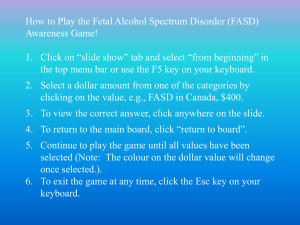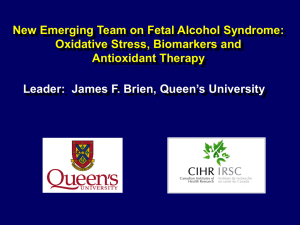Pregnant Women Drinking At The Bar.
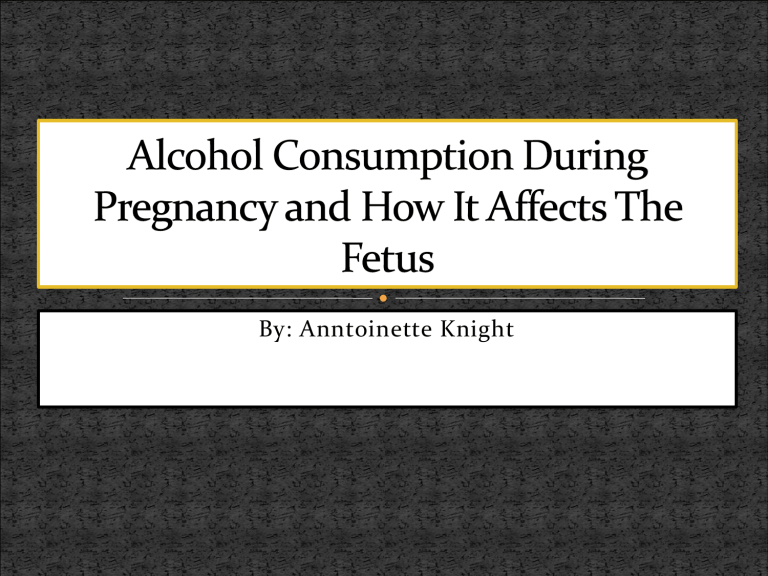
By: Anntoinette Knight
When it comes to consuming an alcoholic beverage while you are pregnant, I feel that the mother is taking her own wants and needs into account with out thinking about the child that she bears. Through out this course I learned that “Alcoholism is a chronic progressive and potentially fatal disease.” (Berns pg
253)So if Alcoholism is a disease is the mother the problem or the people that’s keeping it on the shelves? Drinking alcohol during pregnancy can cause a variety of physical and mental birth defects. Women are having children younger and younger these days. Some do not have the proper support or knowledge to bear the babies that they are having and they are the first ones to take that trip to the liquor store because they have not been taught to deal with their emotions or daily life. Women who are pregnant or might get pregnant should abstain from using alcohol.
I choose to address the problem because many unborn babies and infants are loosing their lives every day to Fetal Alcohol syndrome. There needs to be a law that prevents mothers from consuming alcohol beverages at the time that they find out they have conceived. There is no law that stops women from consuming alcoholic beverages during pregnancy and that needs to change. Although many women are aware that heavy drinking during pregnancy can cause many birth defects, they do not realize that moderate or even light drinking can also harm the fetus.
This problem affects me in so many ways. My heart goes out to all the children who are victims to a mother who chose to put her wants first. I grew up in a community where I seen women have miscarriages every year because they could not put the drink down. The children that survived was born with physical birth defects, down syndrome and other various types of mental disabilities. I became curious as to what would make a women do this to her unborn child. I have four children and all of them was born healthy. I could not imagine if I did not give them a chance at life. Women need to know that “Any small amount of liquor taken on only rare days in pregnancy should be below threshold in any pregnancy—but it is likely that it will never be possible to guarantee an absolutely safe low dose of alcohol for any period of pregnancy for a specific individual.” (Clarren pg 153)
I try not to be judgmental but when I find out that most babies who are born with Fetal Alcohol Syndrome (FASDs) exhibit the conditions listed; It affects me in a major way.
Poor coordination
Emotional/mental disability
Short attention span
Deformities of the fingers, joints, and the limbs
Physical disabilities
Poor muscle tone
Behavioral problems
Intellectual disabilities
(Center for disease control and prevention)
I find it hard not to feel some type of sympathy for that child.
I believe that this problem will have a major affect on families and the community. Children whom are born with
Fetal Alcohol Spectrum Disorder , Fetal Alcohol Syndrome or Attention Deficiency Hyperactive Disorder show not only physical effects of their disease are present but the mental part carries the same weight. When a child walks down the street and they have the features of a child with a disability, another child is going to recognize that the child is different immediately. Children are judgmental and cruel by nature. I know many four year old children who are not afraid to express them selves and they will clearly say another child is fat or ask the question; why does that girl talk like that?
Women who put their fetus at risk do not understand the long-term effects that drinking while pregnant has on the fetus. Children With FAS exhibit behavior problems in school. More than a third of children with the syndrome develop drug and alcohol problems by adolescence and the young adult years. As children with FAS get older, they have high rates of psychological problems. Many have anger control problems and may be violent. They are at high risk for getting into trouble with the law. Below are some photos of children who possess the characteristics of FAS.
Characteristics
Cont……
Children with FAS all share some of the same characteristics
Epicanthal Folds
Small Head
Flat midface
Underdeveloped jaw
Small eye openings
Flat Nasal Bridge
Railroad track ears
Unturned nose
Smooth philtrum
Thin upper lip
Brain Size of
Infants
Comparison of
Brain of Infant
Prenatally
Exposed to
Alcohol (left) and
Normal Infant
Brain (right)
I would like you to watch this video of an “Ultrasound Fetal
Response To Alcohol Fetal Alcohol Syndrome.” Beware, this video will really touch your heart.
www.youtube.com/watch?v=oL2k5SMKrY4
Doctors have warned that consuming even small amounts of alcohol while pregnant can affect their child’s mental development. There is no safe level of alcohol consumption during pregnancy. Even moderate consumption of alcohol has a serious effect on the babies central nervous system.
I would also like you to watch this video “ Pregnant Women
Drinking At The Bar.” This women should be arrested. Look at how many people think that this behavior is ok. Is there any one at the bar that cares for the unborn child?
http://www.youtube.com/watch?v=RlW5mxJxnmU&feature=related
“Fetal Alcohol Syndrome & Spectrum Disorders/ FAS FASD
Video” www.youtube.com/watch?v=N8pBvjoMcoM&feature =related
Fetal alcohol syndrome is one of the leading causes of mental retardation in the US. FAS is an irreversible, lifelong condition that affects every aspect of a child's life and the lives of the child's family. (March Of Dimes)
Fetal Alcohol Spectrum Disorder’s (FASD’s) is a major case because it consist of a group of conditions that can occur in a person whose mother drank alcohol during pregnancy. These effects can include physical problems and problems with behavior and learning. Often, a person with an FASD has a mix of near fatal conditions such as Fetal Alcohol Syndrome,
Attention Deficit Hyperactivity Disorder and other conditions. (Centers For Disease Control and Prevention)
The Centers for Disease Control and Prevention (CDC) has conducted studies that have shown 0.2 to 1.5 cases of fetal
alcohol syndrome (FAS) occur for every 1,000 live births in certain areas of the United States. Other studies using different methods have estimated the rate of FAS at 0.5 to
2.0 cases per 1,000 live births. The United States has the highest rate of FAS while Japan has the lowest. Though it is hard to find out exactly how many women are consuming alcoholic beverages while pregnant but when know how many children are born with the disease.(Centers for Disease Control and Prevention)
Another case of drinking while pregnant (a mothers poor choice of behavior) associated with FAS would be ADHD
(Attention Deficit Hyperactivity Disorde r).
I believe that the most significant case would be Fetal
Alcohol Syndrome (FAS)
I believe that fetal alcohol syndrome is a condition that consists of very serious severe effects including fetal death. A national survey found that more than half of women age 15-44 drank while pregnant. The women who reported drinking during their pregnancy, 66% reported drinking in their first trimester; 54% reported drinking in their third trimester. (G Ian
Gallicano et al) FAS is estimated to occur in 1 to 2 live births per every 1,000 in the United States every year According to the birth defects monitoring program, FAS rates among
American Indians are 3.0 per 1000 live births compared to a rate of 0.6 per 1000 live births among Blacks and 0.1 per 1000 live births among Whites. (Fact Sheet) FAS is not just a childhood disorder; exposure to alcohol as a fetus can cause a wide range of life long physical and mental disabilities.
Fetal alcohol exposure may increase the risk for later alcohol, tobacco, and drug dependence in adults. Fetal Alcohol
Syndrome is so significant; a child's chance of survival ends before it begins. I really think that is a sad fact and we need to inform young women to take precautions so that they can have a healthy baby. I have learned through out this project that
“there is no cure for FAS, but children who are diagnosed early and receive appropriate physical and educational interventions, especially those in a stable and nurturing home, are more likely to have better outcomes than those who are not.” (Zieman.
2010.1) To have a healthy baby, mom needs to be healthy and as toxic free as possible.
I feel that this starts with the women that is bearing the child.
Women need to be held responsible for fixing the problem.
They need to be held responsible for the things that they put into their bodies at their own free will. Next I feel like some responsibility should fall on the doctor that is performing the prenatal care for that women. When a women goes in for her first initial prenatal appointment, one of the first procedures is to take blood and urine. If a women child is born with FAS, the people with first contact should be responsible for fixing the problem.
1. Public health strategy’s have been used for reducing FAS:
Public health messages that target alcohol abuse and higher taxes on alcoholic beverages. (Clarren)
2. Public law 100-690 was implemented in 1989, requiring warning labels on all alcoholic beverages sold in the United States. As of 1998 only 19 states require the posting of alcohol health warning signs where alcoholic beverages are sold.
(Zieman. 2010.1)
3. The CDC works with different organizations across the country to develop systems to monitor FASD exposures and outcomes, conduct epidemiologic studies and public health research to identify maternal risk factors associated with giving birth to a child with an FASD, and implement and evaluate FASD prevention and intervention programs.
1. I do not believe that Public Health strategies are working. I do not believe that taxing alcohol is going to make a difference because all people do is find other ways to buy the alcohol that they want. The money is going to always be available. If I was pregnant I could walk into the store right now and buy a beer with no questions asked just because I had the money.
Higher taxes are not going to stop me from getting what I want; It is just going to make me go and try to make more money.
2. I do believe that this law helped somewhat. It actually required manufactures to post labels onto their alcoholic beverages. I wonder just how much it helped though. The Center For Science in Public Interest states that “Only 19 states are required to post surgeon generals warning on their labels.” The last time I checked a map there was 50 states in the united states. That means that a lot of women are missing the information.
3. The Alcoholic Policies Project has found that In 1995, four times as many pregnant women frequently consumed alcohol as in 1991. A national survey found that more than half of women age 15-44 drank while pregnant. This is a big problem and I feel that the people whom are responsible are not taking the necessary precautions to have a healthy baby. So I do not believe this solution is working. Statistics can say one thing and people will do another.
Women need to be prosecuted for the actions that they take.
My recommendation for fixing the problem would be to first inform the public. If more women was informed about the negative affects that consuming alcoholic beverages has during pregnancy I believe that they would make better choices.
Sometimes when people do not understand the fine print on the bottle than you have to give them a visual. That is why I provide the illustration “This is what your fetus is doing while you are enjoying your drink.” I would also make more visual/audio public announcements for the women that do not understand the text. At this time there is no law that says that women can not consume alcoholic beverages while pregnant.
Strict laws should be made and put into effect. If women do not want to comply and have a safe and healthy baby then they should be prosecuted.
It is all left up to each individuals free will. I believe that new laws need to be made and taken into effect. I also believe that when women find out that they are pregnant, or if they plan to conceive, it should be mandatory to take drug and alcohol preventative classes on top of their prenatal treatments. Women with a history of having children with FAS should be prosecuted . They need to know that they are not only destroying the fetus but if the child does have a chance at survival than he/she will have developmental and physical disabilities. I believe that stands hand and hand with attempted murder .
WARNING
Consumption of alcoholic beverages during pregnancy is prohibited by law. It causes different cases of birth defects like:
Down Syndrome, Fetal Alcohol
Syndrome, Attention Deficient
Hyperactive Disorder and it is linked to many cases of mental retardation in early childhood.
Illustrations should be attached to all alcoholic beverage labels in all
50 states.
First the responsibility has to fall on the person that is bearing the child. Women should be held accountable for the actions that they take while they are pregnant. Their should be laws established and enforced to make sure that women do not consume alcoholic beverages while pregnant. I also believe that Doctors, hospitals staff, and courts should be responsible. When a women goes to have her baby the first contact that she has upon delivery would be the hospital staff. The nursing staff and doctors are there to assist the mother and the child. If the infant is at risk than the hospital staff need to do what it takes to insure that the child is not in any harms way.
I believe that these individuals will be willing to implement these solutions. A lot more women today want to have healthier babies and they want to be good mothers to their child. Doctors and hospital staff do not want the pressure and the legal battles that come along with the
Department of Social Services getting involved. If they do not report the necessary information than their license will be in jeopardy and law enforcement gets involved.
The resources are available for the women whom seek them. One way to get to the solution is to have the person admit that they have a problem. There is a tool called the CAGE questionnaire. It is a tool for initiating the diagnosis of alcoholism. (The Gale Encyclopedia of
Medicine) I believe that this should be used at all prenatal appointments to prevent any complications.
It is a fact that The Substance Abuse and Mental Health Services
Administration´s (SAMHSA) FASD Center for Excellence is offering funding for programs designed to address fetal alcohol spectrum disorder (FASD) Funded programs should be designed to decrease the incidence of FASD by implementing evidence-based programs to eliminate alcohol consumption by pregnant women, or improve the functioning and quality of life of people with FASD and their families through proper diagnosis and intervention. (Grants Available)
The problems that I foresee in the implementation of the solutions are that; women will be to lazy to get out and get the necessary help that they need. Many people will follow their addiction before they assume that they have a problem. That is a big problem because to know that you need help you have to first admit that you have a problem. If women get the treatment that they need then there will be more healthy babies produced in the world.
Books
Books
Berns, R. (2007, 2010). “Child, Family, School, Community: Socialization and Support.” Eighth Edition. Wadsworth, Cengage Learning.
Sterling K. Clarren, M.D. “Drinking In Pregnancy: A Recommendation For
Complete Abstinence”
Academic Journals
Gayle Zieman. 2010.1, “Fetal alcohol problems.” Clinical Reference
Systems 2010.1 (Feb 1, 2010)
G Ian Gallicano “Alcohol and its effect on fetal development: what do we know?” Pediatric Health (Oct 2010): p459
C. R. C. M. S. Bill Asenjo, Teresa G. Odle, A. M. Tish
Davidson and Jacqueline L. Longe. March 1, 2009. (3426 words) ”
Alcoholism, (Disease/Disorder overview)” The Gale Encyclopedia of Medicine
Internet Resources
Center for disease control and prevention “Fetal Alcohol
Disorders (FASDs)”
Spectrum www.cdc.gov/ncbddd/fasd/data.html
Center For Science In the Public Interest “Alcohol Policies Project:
Advocacy for the Prevention of Alcohol Problems” (Fact sheet) www.cspinet.org/booze/fas.html
March Of Dimes “Alcohol and Drugs: Drinking alcohol during pregnancy” www.marchofdimes.com/pregnacy/alcohol_indepth.html
CADCA “
Grants Available for Programs to Prevent Fetal Alcohol Spectrum
Disorder” www.cadca.org/resources/detail/grants-available-programs-prevent-fetalalcohol-spectrum-disorder
Rosary films www.youtube.com/watch?v=oL2k5SMKrY4
Rosaryfilms www.youtube.com/watch?v=RIW5mxjxnmU&feature=related
Rosaryfilms www.youtube.com/watch?c=N8pBvjoMcoM&feature=related
